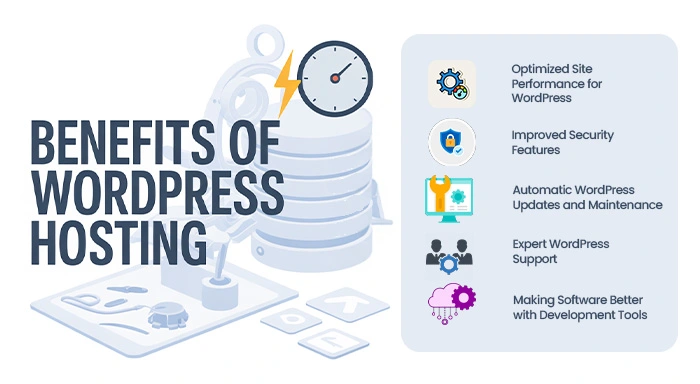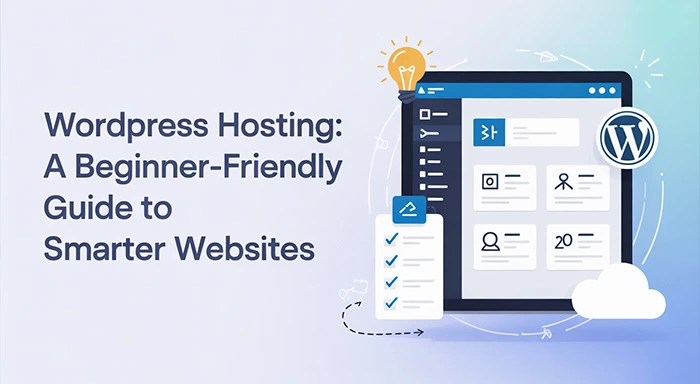Selecting the ideal WordPress hosting can either make or break your website. With so many hosting companies out there, selecting one that has the optimal combination of speed, security, and cost can seem daunting. This blog will explain all there is to know about WordPress hosting and provides you with a clear and intelligent choice that can facilitate your site’s growth.
What is WordPress Hosting?
WordPress hosting is a hosting type that is optimized for WordPress content management system (CMS) use. It normally offers the server configuration and resources necessary to efficiently run WordPress. Top WordPress hosting providers have advantages like automatic upgrades, great security, and optimized performance. WordPress hosts offer either cPanel or a homegrown admin panel to make it easy to manage sites and their configurations.
Factors to Consider When Choosing WordPress Hosting
Here are few factors that you should consider while choosing WordPress Hosting:
1. Speed and Productivity
A speedy website makes your customers and contributes to positive SEO Outcomes. With most of Google’s core web vitals being about performance, selecting a hosting company that values speed is critical. Opt for hosts with added features like object caching, a CDN included for free, the latest versions of MySQL and PHP supported, and other speed-enhancing features that will get your site higher in the SERPs.
2. Safety Features
When looking into hosting partners, make sure they provide free SSL certificates, web application firewalls (WAF), malware scanning, distributed denial of service (DDoS) protection, and the option to back up and restore your site. Proper security features prevent your site from being accessed by malicious individuals, like hackers, who would be over the moon to take control of your website.
3. Adaptability
When you select a hosting partner, think about the big picture and not where you are today. Your business is new, but opting for the lowest-cost hosting company you can find may be tempting, yet it’s worth thinking ahead about future growth by keeping your WordPress site scalable. Opt for a host that can change your plan easily as your business expands. That way, you will avoid costly downtime or potential issues when transferring your site to another host.
4. Ease of Use
Regardless of whether you’re new to WordPress or an experienced professional, having a host with an easy-to-use dashboard matters. Most hosts for WordPress include cPanel or an alternative through which to manage the server’s configurations. For instance, SiteGround employs its own Site Tools dashboard whereby you can access the file manager, create FTP accounts, access MySQL and phpMyAdmin, and more. No matter which host you select, learn how you will handle your server’s configuration so that you can easily get through server-related tasks.
5. Customer Assistance
Server issues are one of the most frustrating things about being a site owner. When searching for your next host, consider the level of support they provide. Choose hosts that provide round-the-clock support since you never know what hour of the day your site will have an issue. Also, check for several contact options for the host, be it live chat, phone, email, or a mix of all three.
Benefits of WordPress Hosting

1. Optimized Site Performance for WordPress
WordPress hosting companies setup servers specially for WordPress, such as optimized PHP versions, caching setup, and database setups. This leads to accelerated loading and improved overall site performance compared to regular web hosting.
2. Improved Security Features
Advanced WordPress hosts implement security measures tailored to WordPress-specific vulnerabilities, including automatic malware scanning and firewall protection against targeted attacks. They also offer automatic security updates to keep your site safeguarded without manual intervention. They also provide automatic backups and one-click restore for many.
3. Automatic WordPress Updates and Maintenance
Most WordPress hosting companies automatically implement core WordPress upgrades, plugin upgrades, and security patches. This prevents technical requirements from owners and keeps sites updated with the most recent features and security patches.
4. Expert WordPress Support
WordPress hosting companies’ support teams have a deep understanding of WordPress and can efficiently resolve related issues, including plugin incompatibilities and theme conflicts. They also specialize in performance optimization, ensuring smooth and reliable site operation. This technical know-how proves to be valuable when dealing with WordPress-related issues.
5. Making Software Better with Development Tools
Most hosting providers for WordPress provide staging sites where you can test changes, updates, and new features and push them live afterward. They also typically have developer-friendly tools like Git integration, WP-CLI access, and easy database management tools that enhance the process of development.
All of these benefits render WordPress hosting particularly helpful for businesses and individuals who prefer to focus on developing content and business growth rather than server administration and technical maintenance.
Best WordPress Hosting Options
When conducting an overall WordPress hosting comparison, it’s crucial to evaluate each company’s unique strengths, features, and WordPress maintenance services. Below is a review of the leading providers that consistently offer the best hosting for WordPress in the industry:
1. WP Engine
WP Engine is lightning quick—your site begins loading in a mere 354ms, the highest speed of all hosting services we tested. It remains up nearly all the time (99.99% uptime, too). It’s a WordPress-based hosting service that handles the heavy lifting for you and provides robust features designed for large businesses.
WP Engine ensures easy management of your site by keeping it fast, secure, and updated. Updates are handled automatically and defenses against threats, freeing you from technical risk. Your content remains safe with daily backups and you can try out changes in a staging environment before they go live—giving you peace of mind and control.
2. SiteGround
SiteGround is a top web hosting company providing solid and high-performance hosting solutions designed for individuals and enterprises. It caters to all types of hosting—shared, cloud, reseller, and WordPress-optimized—to support anything from personal blogs to large business sites. Being famous for excellent customer support and advanced security features such as daily backups, free CDN, and SSL encryption, SiteGround runs on Google Cloud infrastructure with data centers in various countries.
3. Hostinger
Hostinger is one of the lower-cost WordPress hosting providers with great VPS pricing. VPS is less powerful than dedicated hosting, but it still gives you a portion of a server that’s entirely your own, along with a dedicated IP address. It also includes weekly backups, access to an AI assistant, and at least 50GB of fast NVMe storage for optimized performance.
4. Bluehost
If the most important thing to you is having a good budget web host, then look at Bluehost. One of the three web hosting companies WordPress recommends, Bluehost offers a lot of bang for the buck. Even their most entry-level plan includes freebies such as a domain name for one year, an SSL, CDN, and no less than 10 GB of solid-state drive (SSD) storage.
FAQ
What Is Web Hosting? What Types of Hosting Exist?
Web hosting provides space on servers so websites can be accessed online. The main types include shared, VPS, dedicated, cloud, and managed hosting—each offering different levels of speed, control, and support.
What is the cost of web hosting?
Basic shared hosting starts around $2–$15/month, while VPS, cloud, or dedicated hosting can range from $20 to $300/month or more.
Can I host my own website?
Yes, you can self-host with your own server and internet connection, but it demands technical knowledge, 24/7 maintenance, security administration, and consistent power/internet infrastructure.
Why is web hosting important?
Web hosting is important because it maintains websites open and operational twenty-four hours a day, gives websites the storage they need, offers fast loading speeds, and gives security measures, emails, and technical support to maintain everything in working order.
What is an example of a web host?
When we talk about web hosts, some of the more known names you can recall are Bluehost, SiteGround, Hostinger, GoDaddy, and WP Engine. All of these hosts offer a variety of hosting plans that suit various website needs and budgets.


 Share on media
Share on media

%201.png)

%201.png)

%201.png)
